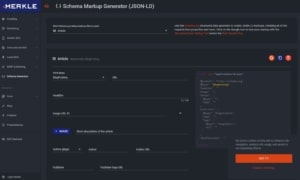Creating Site Schema for Blog Posts
Understanding Site Schema
On-page SEO is a vital part of the ranking process, but it is only one facet of a comprehensive, sustainable plan. Off-page and technical SEO is also an indispensable part of SEO that can often be overlooked. Things like site schema, which is the code added to web pages that help search engines better understand your content and display relevant results, can be great ways to give your site the edge needed to achieve rich search results on Google. Site schema can be used for a variety of cases, so the nature of what is included can vary. Some of the most commonly used types include:
 Creative works
Creative works- Events
- Places
- Organizations
- Reviews
- Products
- Services
- Articles (News articles, blogs, etc.)
As you can see, there are many forms of schema markup. So, we are only going to focus on one at a time. For this post, we are going to be going over how to create a site schema for Articles and the more specific sub-set, blog posts.
Forms of Schema
Due to the wide variety of uses for site schema, there exists a hierarchy for each set of schema types, each with its own set of properties. You could likely have an entire college course dedicated to understanding the uses of each type of schema. But, for the purposes of this post, we only need to know that the schema we create for blogs is classified as “Creative Work” which also includes things like books, movies, photos, software programs, etc. Article schema falls under the CreativeWork schema, and under that, we can find the “BlogPosting” schema itself.
Creating Site Schema
Creating site schema markup is a more precise process than you may think. Since site schema markup is technically code that is being added to the site, there isn’t a lot of room for error. But, you don’t need to be an expert in a coding language to create it! There are many tools out there that can help you reliably create site schema and apply it to your website. However, it is worth mentioning that there are multiple ways to create the schema.
Different forms you can use include JSON-LD (Javascript Object Notation for Linked Objects), Microdata, and RDFa (Resource Description Framework in attributes). But, we will be using JSON-LD in this case. This is because of its user-friendliness compared to setting up schema using Microdata or RDFa. The latter two options are much more involved when it comes to things like HTML tags, attributes, and code. But, there are tools out there that can help you set up JSON-LD schema with relative ease.
 A trusty and useful tool to create JSON-LD markup that I’d like to highlight is Merkle. This offers a variety of tests and resources that can help improve various parts of your site including rendering, crawling, mobile SEO, and more. In addition, it also helps outline specific data that can be used for creating blog schema. Once you have all the info necessary
A trusty and useful tool to create JSON-LD markup that I’d like to highlight is Merkle. This offers a variety of tests and resources that can help improve various parts of your site including rendering, crawling, mobile SEO, and more. In addition, it also helps outline specific data that can be used for creating blog schema. Once you have all the info necessary
Important Elements of BlogPost Schema
Knowing which specific types of site schema markup to use is important. But what is equally vital is recognizing the important parts of the BlogPosting schema. While there are a variety of properties that can be used that belong to the encompassing types of schema (like CreativeWork or Article), only some things may be necessary or possible to include on your site. Using Merkle, we can identify the most important information you will need to create schema markup for individual blog posts.
The key properties you will likely need to consider include:
- The URL of the blog post
- Headline (title of the blog)
- Image URL (a featured image for the post)
- Short description of the blog (meta description)
- Author (name and URL for associated page)
- Publisher name (your practice) and logo URL (practice logo)
- Date published (and/or modified)
Validating Blog Schema
As mentioned previously, the tools available that can validate your schema are invaluable resources to help ensure everything is running smoothly. Resources like Merkle often do a great job of creating structured data. But, it is good practice to verify things are working firsthand. You can generate site schema using different tools, but other resources should be used to ensure your schema is going to have the intended effect. Two other important tools include Site Schema Validator and Google Rich Search Results. Both are great resources for making sure that the schema you create is working and is eligible for rich results in the search engine. Starting with the Site Schema Validator will let you know if any errors or missing info are present, and the Rich Search Results will ensure you are in the running for enhanced results in the SERP.
The importance of site schema
 Site schema can help further improve your site in so many different ways. The benefits of blog schema in particular include creating richer search results and making it easier for Google to understand the content of your blog. However, this can only occur if the schema is properly implemented. So, it is important to keep up with the schema on your site even after you add it. Keeping schema up to date will ensure that it continues to work benefit your site, and help drive more traffic to your blog.
Site schema can help further improve your site in so many different ways. The benefits of blog schema in particular include creating richer search results and making it easier for Google to understand the content of your blog. However, this can only occur if the schema is properly implemented. So, it is important to keep up with the schema on your site even after you add it. Keeping schema up to date will ensure that it continues to work benefit your site, and help drive more traffic to your blog.
Book a Consultation with Simplified SEO Consulting
Our team of SEO specialists can help you create schema and also improve on-page SEO elements. You can receive support with your SEO strategy with Simplified SEO Consulting by following these simple steps:
- Apply to work with us to improve your SEO
- Meet with an SEO specialist
- Start improving both off and on-page SEO!
Other Services Offered with Simplified SEO Consulting
Our team knows there are many aspects of SEO that you may need help addressing on your site. This is why we offer a variety of SEO services. Other services offered include our Done For You SEO Services and DIY Online SEO Courses. We also offer a 12-week Done With You Intensive SEO Program. Visit our blog to learn more today!
About the Author
Sterling Humburg-Cage graduated from the University of Missouri with a BA in Psychology in 2020. He has integrated what he learned in school into his work as an SEO Specialist with Simplified SEO Consulting. Sterling prides himself on helping current clients & alumni problems solve difficult SEO issues. He’s great at giving clients multiple options about how to approach a situation, finding solutions to some of the more technical aspects of SEO, and responding in a timely manner to client concerns. Since he started, Sterling has met frequently with our alumni and provided them with extra problem-solving support. He now provides additional support with a variety of local SEO services. He often goes the extra mile to do outside research. By doing so, he sure private practice owners have everything they need to rank well on search engines long term for the keywords their ideal clients are using!




Leave a Reply
Want to join the discussion?Feel free to contribute!